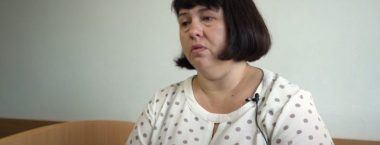
“People in their homes were dying from cold” – a nurse from Kharkiv
Interview by Taras Viychuk – I am 42 years old. I live and work in...
17 May 2022
02.02.2017
Tamara Martseniuk, a gender expert, continues to interview women, who work in the field of Ukrainian advocacy. This time the interviewee of our permanent rubric “Women Human Rights Defenders, Who Change Ukraine “ is a lawyer of the Strategic Litigations Center of UHHRU Alina Pavliuk.
Alina Pavliuk earned bachelor’s and master’s degrees at the Kyiv National Economic University named after Vadym Hetman. Her master’s thesis topic of was “Protection of the right to respect for private and family life, the international legal dimension and national legal practice.” The results of the scientific research were published in the Unified Register of Advocates of Ukraine: the issue of further reforms” in the Law Journal (2014). In 2014-2015, Alina worked as a lawyer at the UHHRU Project «Prisoners of War UA» aimed at freeing the captives and tracing the missing persons in the ATO zone.
– Please share your history of involvement in the human rights movement in Ukraine. Why did you decide to work in this field?
– It is difficult to tell the whole history. I am inclined to think that the fate has developed so that human rights protection became my major. My practice in jurisprudence I started in the field of civil and commercial law at the time of my studies at the University. Then 2014 came, the annexation of Crimea and events in eastern Ukraine. I had the opportunity to work as a volunteer with stories of UHHRU prisoners, to do anything to speed up the return of these people to their families. So gradually I focused on human rights protection and field-specific issues of the protection of the rights of victims of armed conflict in eastern Ukraine.
– Where have you got human rights education and knowledge?
– I received the basic practical knowledge in the field of human rights in the process of work. I received the skills with the help of UHHRU experts. During the practice, I had to work on the skills of interviewing victims of the conflict to record violations of human rights fully. Also the training with the support of the European Human Rights Advocacy Centre (EHRAC), a French human rights organization in Strasbourg, the Center for International Protection (Centre de la protection internationale) and human rights educational events of UHHRU allows expanding knowledge in the field of human rights in the European Court of Human Rights.
– What is your area of focus in the field of human rights?
– My major field is the armed conflict in eastern Ukraine, protection of human rights at both national and international levels. In terms of complaints to the European Court of Human Rights, the following categories of affected by the events should be mentioned: captured, missing, killed. Also, war crimes under the Rome Statute.
– Did you work with the theme of women’s rights?
– I have not worked with the theme on a large scale, only with stories of women who have been captured, but in my experience, fortunately, such incidents were not widespread.
– In your opinion, what are the greatest successes of the human rights movement in Ukraine?
– I think the importance of human rights has increased, because of the human rights movement in Ukraine. Quite a number of topics rose by human rights organizations in society and acquired a resonance. Attention and public attention to human rights violations are the greatest achievement.
– What are challenges of the modern human rights movement in Ukraine?
– Every situation has two positions. Under this scheme, you can analyze the human rights work in Ukraine. Researching issues and looking for ways to address them lead to the situation, when the position of human rights defender and public bodies are fundamentally different. As for me, in view of the situation with the armed conflict in eastern Ukraine, the biggest challenge is the inability of the parties to listen and hear each other. Often such a situation is observed from a position of public bodies. As long as we face the misunderstanding and the inability to go to contact, we will continue to go around the problem without the ability to solve it. As a result, we are all working for the victims; isn’t it worth going in the same direction to achieve effective results?
– In your opinion, is it enough attention paid to gender issue by the human rights movement?
– I believe that gender issues recently gained significant importance for the human rights sphere. It is difficult to say what caused it. Maybe, the issues raised by the conflict as well. Perhaps, society has become more open to problems and began to talk about, but not enough to trust people around, to make the histories of the victims more open. For me, the only work with individual stories of victims can make a difference in relation to gender-based violence.
– Gender-based violence is a serious problem, particularly in Ukraine. In your opinion, what should be done to improve the situation?
– For me, the main thing to do is to change the approach to the problem. The state must provide adequate protection for victims of gender-based violence. They must understand that they are not in danger if they talk about the problem that they cannot be left alone with their history. Therefore, to understand the problem and to open the way to address a victim and her feelings should be at the first place.
– What or who inspires you the most in your human rights work?
For me, the greatest source of inspiration in work is people with whom to work. The armed conflict causes the appearance of quite different categories of victims, each of whom must find a single approach. ‘We have to discover a history of a person, to try to understand her actions, feelings, and suffering. Otherwise, we would not get the credit of trust of the interlocutor. When you open a person, the understanding that your work is important comes. When you see sincere and open eyes, you realize that there is the true inspiration.
Interview by Tamara Martseniuk
Photo by UHHRU, Ukrinform
This series of interviews is dedicated to activists working in various areas of human rights protection. This year we celebrate the 40-th anniversary of the Ukrainian Helsinki Group, pioneers of Ukrainian human rights movement. UHHRU is its successor. We have developed an in-house policy of gender equality and non-discrimination and strive to make Ukrainian women human rights activist more visible in society.
If you find an error on our site, please select the incorrect text and press ctrl-enter.

Interview by Taras Viychuk – I am 42 years old. I live and work in...
17 May 2022

The Kharkiv Human Rights Group (KHRG) is documenting international crimes (genocide, crimes against humanity, war...
14 April 2022

The Global initiative “Tribunal for Putin” invites to a closed online event “Kyiv region under...
12 April 2022

The Global initiative “Tribunal for Putin” invites to a closed online event “Kyiv region under...
12 April 2022